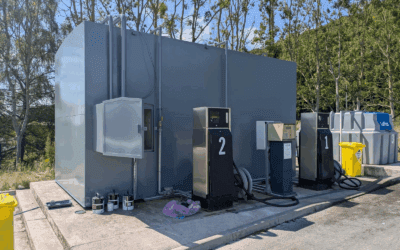
The transition to renewable transport fuels is essential in the global effort to combat climate change. These fuels, derived from sustainable resources, offer a cleaner alternative to fossil fuels, particularly in the transport sector, which is a significant contributor to carbon emissions. As countries worldwide commit to reducing greenhouse gases, renewable fuels like Hydrotreated Vegetable Oil (HVO100) are becoming pivotal in achieving sustainability targets.
Renewable Transport Fuels Overview
Renewable transport fuels, such as HVO100, are produced from renewable resources like plant oils, waste fats, and organic residues. These fuels provide a viable alternative to traditional diesel, which is a major source of pollution. HVO100, in particular, has garnered attention for its high quality and versatility.
This renewable diesel can be used as a direct replacement for conventional diesel, offering up to a 90% reduction in greenhouse gas emissions over its lifecycle. Unlike some alternative fuels, HVO100 is fully compatible with existing diesel engines, meaning no modifications are necessary for its use. This makes it an attractive option for fleet operators and public sector transport systems that seek to reduce their environmental impact without incurring significant additional costs (Neste Belgium) (Eurowag).
The demand for low-carbon transport solutions is growing rapidly as governments strive to meet stringent emissions targets. In Europe, this trend is particularly evident, with increased adoption of renewable fuels in sectors where electrification is challenging, such as heavy-duty vehicles and public transport. These efforts align with broader European goals to decarbonise the transport sector, demonstrating a commitment to reducing reliance on fossil fuels (Argus Media).
France's Leadership in Renewable Fuels
France has emerged as a leader in promoting renewable fuels, recently approving the sale of 100% renewable transport fuels, including HVO100, at fuel stations nationwide. This policy shift marks a significant step in the country’s strategy to reduce carbon emissions, particularly in the transport sector. Previously, the use of pure biofuels like HVO100 was limited to logistics companies with dedicated supply networks. However, the new regulations now allow widespread access to these fuels, enabling both commercial and private vehicles to benefit from significant reductions in greenhouse gas emissions (Neste Belgium) (Argus Media).
This decision is already having a profound impact on the French transport sector. Public transportation and commercial fleets are increasingly adopting HVO100, reflecting the fuel’s practicality in meeting stringent emissions targets without the need for costly engine modifications. The availability of HVO100 at fuel stations across France further supports the national agenda of reducing reliance on fossil fuels and advancing towards a more sustainable future (Neste Belgium).
European Success Stories
Beyond France, other European countries are also leading the charge in the adoption of renewable fuels. Sweden, for instance, has implemented a robust biofuels policy that has resulted in the widespread use of HVO100 in public transport fleets. This has significantly contributed to the country’s efforts to meet its carbon reduction targets. Similarly, the Netherlands has successfully integrated renewable fuels into its transport sector, particularly within municipal fleets. These initiatives have led to substantial reductions in carbon emissions, showcasing the effectiveness of renewable fuels in achieving sustainability goals (Eurowag) (VARO Energy).
These examples highlight the pivotal role that the public sector can play in driving the adoption of renewable fuels. By prioritising sustainability in their transport strategies, governments and municipalities across Europe are not only meeting their emissions targets but also setting an example for the private sector to follow. The success stories from Sweden and the Netherlands serve as powerful models for other regions aiming to transition to cleaner energy sources (Eurowag) (VARO Energy).
Key Benefits of Adopting Europe's Approach
Adopting renewable transport fuels offers significant environmental benefits, including reduced greenhouse gas emissions and improved air quality. Economically, transitioning to fuels like HVO100 can reduce dependence on fossil fuel imports, enhance energy security, and create new green jobs. The experiences of countries like France, Sweden, and the Netherlands demonstrate the feasibility of integrating renewable fuels into existing infrastructure. By following these examples, other regions can achieve substantial environmental and economic benefits (Neste Belgium) (Argus Media).
Addressing Challenges
The transition to renewable fuels like HVO100 is not without challenges. Key obstacles include limited infrastructure for distribution, higher costs compared to traditional fuels, and concerns about the sustainability of feedstocks. However, Europe’s experiences offer valuable insights and practical solutions:
- Infrastructure Expansion: The expansion of HVO100 refuelling stations, as seen in the Netherlands, can greatly facilitate broader adoption (Eurowag).
- Economic Incentives: Strong government policies and financial incentives, such as those in Sweden, can help offset the higher costs associated with renewable fuels, encouraging wider adoption (Neste Belgium).
- Sustainable Feedstock Management: The European Union’s Renewable Energy Directive II (RED II) promotes the use of advanced biofuels produced from non-food feedstocks, ensuring that the production of renewable fuels does not adversely impact food supply or biodiversity (Home of Energy News).
- Public Awareness: Public education campaigns have successfully increased confidence in renewable fuels, driving adoption and supporting the transition to a low-carbon economy (VARO Energy).
Conclusion
The adoption of renewable transport fuels like HVO100 is a critical step in addressing climate change and reducing greenhouse gas emissions. Europe’s leadership in this transition provides a compelling example for other regions. With the right policies, infrastructure, and public support, the shift to renewable fuels is both achievable and effective. By embracing these fuels, countries can reduce their carbon footprints, enhance energy security, and contribute to a more sustainable future (Eurowag) (Argus Media).








